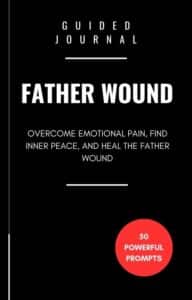In the intricate tapestry of our lives, the relationships we share with our parents are often the most profound. They shape our perceptions, influence our choices, and leave an indelible mark on our souls.
Yet, sometimes, these connections are marred by pain and unresolved emotions, creating what is commonly known as a “father wound.” This emotional burden can manifest in various ways, impacting our self-esteem, relationships, and overall well-being.
If you find yourself grappling with the complexities of a father wound, journal writing can be a powerful tool for healing and self-discovery. It offers a safe and sacred space to unravel the layers of your experiences, delve into the depths of your emotions, and find solace in the written word.
To assist you on this transformative journey, we have curated 50 profound journal writing prompts that will guide you towards healing your father wound.
Understanding the Father Wound: Healing the Unseen Scars
What is the Father Wound?
The Father Wound refers to the emotional and psychological impact resulting from an absent, neglectful, abusive, or emotionally unavailable father figure in one’s life. It is a wound that affects both men and women, transcending gender boundaries. It is important to note that the Father Wound is not solely limited to biological fathers but can also encompass stepfathers, adoptive fathers, or any significant male figure in a person’s life.
Signs and Symptoms of the Father Wound
Emotional Detachment: Individuals with a Father Wound may struggle with forming and maintaining emotional connections. They may find it challenging to express vulnerability, fear intimacy, or fear rejection, as they have experienced emotional abandonment in their formative years.
Low Self-Esteem: The absence or negative influence of a father figure can significantly impact one’s self-worth. Those with a Father Wound often struggle with feelings of inadequacy, self-doubt, and a persistent sense of not being “good enough.”
Trust Issues: Trust is a fundamental element in any relationship. Unfortunately, individuals with a Father Wound may find it difficult to trust others due to the betrayal or abandonment they experienced in their childhood. This can lead to a pattern of guardedness and emotional distance.
Relationship Challenges: The Father Wound can manifest in various relationship dynamics. Some individuals may seek constant validation or attention from others, while others may struggle with forming healthy and secure attachments. Patterns of codependency or fear of abandonment can emerge as a result.
Father Wound Examples
John grew up with an absent father who was always preoccupied with work. As a result, John grapples with feelings of emptiness and struggles to form deep emotional connections in his personal relationships.
Sarah’s father was emotionally unavailable and prone to angry outbursts. She now finds it difficult to trust others, fearing that they will hurt her emotionally. This fear hinders her ability to form meaningful, intimate relationships.
Michael’s father was critical and constantly belittled him. As a result, Michael battles with low self-esteem and a persistent sense of not measuring up to others’ expectations.
The Father Wound is a deeply rooted emotional scar that can impact various aspects of an individual’s life. Recognizing the signs and symptoms of this wound is the first step towards healing and growth. By acknowledging and addressing the Father Wound, individuals can embark on a journey of self-discovery, healing, and ultimately, the cultivation of healthier relationships. Remember, dear reader, you are not alone, and there is hope for healing the unseen scars of the Father Wound.

Journaling: Unleashing the Power Within to Heal the Father Wound
Have you ever felt the lingering pain of a fractured relationship with your father? The wounds inflicted by a distant or absent father figure can leave lasting imprints on our lives. However, there is a transformative tool at your disposal that has the potential to heal these wounds and bring about personal growth: journaling.
In this comprehensive guide, we will explore the definition of journaling and delve into its profound benefits for healing the father wound. Get ready to embark on a journey of self-discovery and healing as we unlock the power of your own words.
Understanding Journaling
Defining Journaling
Journaling is the act of recording your thoughts, emotions, and experiences in a written format. It serves as a personal space where you can freely express yourself without judgment. Through journaling, you create a tangible representation of your inner world, allowing you to gain clarity and insight into your emotions and experiences.
Types of Journaling
There are various forms of journaling that you can explore to suit your needs. Some popular types include:
- Reflective Journaling: This involves writing about your daily experiences, thoughts, and feelings, allowing you to gain a deeper understanding of yourself.
- Gratitude Journaling: Focusing on gratitude helps shift your perspective towards the positive aspects of life, fostering healing and resilience.
- Prompted Journaling: Using prompts or questions as writing prompts, this method encourages self-reflection and exploration of specific themes or emotions.
Healing the Father Wound Through Journaling
Acknowledging the Father Wound
To heal the father wound, it is crucial to acknowledge its existence. Through journaling, you can create a safe space to confront and explore the pain, anger, or sadness associated with this wound. By giving a voice to your emotions, you begin the journey towards healing.
Identifying Patterns and Triggers
Journaling allows you to identify patterns and triggers related to the father wound. You can track recurring emotions, behaviors, or beliefs that stem from this wound. By recognizing these patterns, you gain awareness and can work towards breaking detrimental cycles.
Cultivating Self-Compassion
Self-compassion is an essential component of healing. Journaling provides an opportunity for you to extend compassion to yourself by offering self-validation and understanding. Through your written words, you can cultivate self-compassion and begin to nurture the wounded inner child.
Reconstructing the Narrative
Journaling enables you to reconstruct the narrative surrounding your relationship with your father. By revisiting past experiences, you can gain new perspectives and challenge preconceived notions. Through this process, you can foster forgiveness, acceptance, and ultimately, personal growth.
The Transformative Power of Journaling
Emotional Release and Catharsis
Writing in a journal offers a cathartic release of pent-up emotions. It allows you to express and process deep-seated feelings, providing relief and creating space for healing and growth.
Increased Self-Awareness
Journaling promotes self-awareness by encouraging honest self-reflection. As you delve into your thoughts and emotions, you gain a clearer understanding of your triggers, needs, and desires. This heightened self-awareness empowers you to make conscious choices that align with your authentic self.
Empowerment and Agency
Through journaling, you reclaim your power and agency. By actively engaging in the healing process, you become the author of your own narrative. This newfound empowerment enables you to break free from the constraints of the father wound and forge your own path.
Dear reader, the healing journey awaits you. Through the power of journaling, you can embark on a transformative path of healing the father wound. By defining journaling, exploring its benefits, and understanding its potential to reshape your narrative, you are equipped to take the first step towards healing.
Grab your pen, open your heart, and let the transformative power of journaling guide you to reclaiming your inner strength and embracing a future filled with healing, growth, and personal fulfillment.

Journal Writing Prompts for Father Wound
Write about the first time you realized you had a “father wound”. What emotions did it stir in you?
Reflect on your earliest memory with your father. How has that memory impacted your relationship with him and others?
What is one thing you wish your father understood about you? Why do you think he doesn’t?
Describe the ideal relationship you would want with your father. How does it differ from your current relationship?
Write a letter to your younger self about your father wound. What wisdom or advice would you share?
What are three things your father did or said that have left a lasting impact?
How has your father wound affected your personal relationships? Describe specific instances.
If you could have a conversation with your father today, what would you say? Write that conversation.
How have you tried to heal your father wound? What methods have worked, and which haven’t?
Imagine a day spent with your father where everything goes as you wish. What happens on this day?
Reflect on the most positive moment you’ve had with your father. How did it make you feel?
What lessons have you learned from your father wound? How have these lessons shaped your life?
Write about a time when you felt misunderstood by your father. What would you like him to understand?
In what ways has your father wound instilled fear or insecurity in you?
How has your father wound influenced your self-perception and self-worth?
What would forgiveness look like in your relationship with your father? Is it possible?
Write about a moment when you felt your father was proud of you. How did it affect you?
How has your father wound affected your career or professional relationships?
What qualities do you wish your father had? How would these have changed your relationship?
Write a letter to your father expressing your feelings about your relationship.
Describe a scenario where your father acknowledges and apologizes for his actions. How does this make you feel?
How has your father wound influenced your parenting style or your perspective on parenthood?
Write about a time when your father disappointed you. How has that experience influenced your expectations from others?
How has your father’s absence or presence affected your life?
What habits or traits have you inherited from your father? How do you feel about these?
How has your father wound shaped your views on masculinity or femininity?
Write about the role of your father in your cultural or family traditions. How has that influenced your identity?
Write an imaginary conversation where you confront your father about your feelings.
Describe a dream where you and your father reconcile. What happens in this dream?
How has your father wound influenced your mental health? Write about specific instances.
What assumptions or beliefs about your father have you had to unlearn as you’ve grown older?
Write about a moment when you felt genuine love or affection for your father. How did that experience affect your relationship?
What would it mean for you to release the pain caused by your father wound?
How has your father wound affected your relationship with authority figures?
Write about your feelings if your father were to genuinely ask for your forgiveness.
How has your father wound influenced your spiritual or religious beliefs?
What are some ways you’ve coped with your father wound? How effective have these strategies been?
Write about a moment when you felt your father truly saw and understood you.
What would it look like to have a healthy relationship with your father?
How has your father wound influenced your ability to trust others?
Write about a time when you wished for your father’s support but didn’t receive it.
How has your father wound affected your decision-making process in significant life events?
Explore the concept of a father figure. Who in your life has filled this role, and how?
How have you tried to break the cycle of hurt caused by your father wound in your own life?
Write about a time when your father surprised you with his actions or reactions.
How has your father wound influenced the way you perceive love and affection?
Describe an instance where you stood up to your father. How did it make you feel?
How has your father wound affected your ability to communicate effectively?
Write about a time when you felt empathy for your father. How did it change your perspective?
Reflect on your journey of healing from your father wound. How far have you come, and what are your hopes for the future?
Download Printable Journal Prompts (PDF) >>
Guided Journal for Father Wound Healing
50 Powerful Writing Prompts to Overcome Emotional Pain, Find Inner Peace, and Heal the Father Wound

Are you yearning for a deeper connection with your father? Do you find yourself carrying emotional burdens from unresolved father-child relationships? The Guided Journal for Father Wound Healing is here to help you embark on a transformative journey of self-discovery, healing, and personal growth. This powerful journal is designed to address the deep-rooted pain of father wounds, providing you with a safe space to explore your emotions, heal old wounds, and ultimately rediscover your inner strength.
Unveiling the emotional impact: Discover the profound influence of father-child relationships on your emotional well-being and personal development.
Unresolved emotions and their consequences: Understand how unhealed father wounds can manifest in various aspects of your life, such as self-esteem, relationships, and career.
The invisible burden: Explore the weight of carrying unresolved pain and the impact it can have on your mental and emotional health.
Acknowledging the pain: Delve deep into the emotions surrounding your father wound, allowing yourself to truly feel and understand the impact it has had on your life.
Breaking the cycle: Recognize patterns and behaviors that stem from father wounds, empowering you to break free from negative cycles and create healthier relationships.
Reclaiming your power: Embrace self-empowerment and uncover your inner strength, allowing you to find your own voice and define your own path.
A safe haven for healing: This guided journal provides a supportive and compassionate space for you to navigate your emotions, reflect on your experiences, and embark on a healing journey at your own pace.
Thought-provoking prompts: Engage in introspective exercises and thought-provoking prompts that encourage self-reflection, emotional release, and personal growth.
The Guided Journal for Father Wound Healing is a vital tool that will support you in your journey towards emotional healing and self-discovery. Embark on this transformative journey today and reclaim your emotional well-being and personal growth. It’s time to heal the father wound and embrace a brighter future.
As we reach the end of this introspective journey, we hope that these 50 profound journal writing prompts have served as beacons of light, illuminating the path towards healing your father wound. Remember, healing is a process, and it requires patience, self-compassion, and a commitment to your own growth.
So, dear reader, as you embark on this journey of self-discovery, take a moment to reflect on the power of your own words. Allow them to unveil the hidden corners of your heart, to release the pain that has been silently gnawing at your soul. Embrace the transformative nature of journal writing, for it has the potential to heal wounds, mend brokenness, and restore the shattered fragments of your being.
And now, as you close your journal and carry the insights gained from this exploration into your daily life, we leave you with a thought-provoking question:
What would your life look like if you allowed yourself to release the burdens of your father wound and step into the fullness of your own healing?

